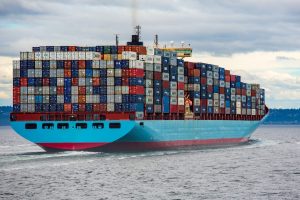
News wire — A number of container ships are anchored in the Red Sea and others have turned off tracking systems as traders adjust routes and prices in response to maritime attacks by Yemen’s Iran-aligned Houthis on the world’s main East-West trade route.
Attacks on ships in the major Red Sea shipping route have raised the spectre of another bout of disruption to international commerce following the upheaval of the COVID pandemic, and prompted a U.S.-led international force to patrol waters near Yemen.
Major shippers including Hapag Lloyd, MSC and Maersk, oil major BP and oil tanker group Frontline have said they will be avoiding the Red Sea route and re-routing via southern Africa’s Cape of Good Hope.
At least 11 container ships which had passed through Suez and were approaching Yemen carrying consumer goods and grains bound for countries including Singapore, Malaysia and the United Arab Emirates, are now anchored in the Red Sea between Sudan and Saudi Arabia, LSEG shiptracking data showed.
Three liquefied natural gas (LNG) vessels have also adjusted their routes to avoid passing by Yemen, according to shiptracking data by Kpler and LSEG Eikon.
Vessels are attempting to mask their positions by pinging on other locations, as a safety precaution when entering the Yemen coastline, said Ioannis Papadimitriou, senior freight analyst at Vortexa.
“Most ships will be turning off their AIS (transponders) at some point in those waters,” one shipping industry source said.
Analysis from maritime AI company Windward showed the number of incidents involving cargo vessels going dark within waters around Saudi Arabia’s exclusive economic zone in the Red Sea rose to 81 in November from 74 in October, after averaging 42 incidents between October 2022 to September 2023.
A Dec. 15 advisory issued by leading shipping associations said ships that switched AIS on and off had been attacked.
“Switching off AIS makes it marginally more difficult to track a ship, but may also hinder the ability of the military to provide support or direct contact,” the advisory said.
PAUSED SAILINGS
Denmark’s Maersk on Friday paused all container shipments through the Red Sea following a “near-miss incident” involving its vessel Maersk Gibraltar. A number of the ships at anchor in the Red Sea are Maersk vessels, LSEG data showed.
On Tuesday it said vessels previously paused and due to sail through the southern Red Sea and the Gulf of Aden would be rerouted around Africa.
The Iran-backed Houthis, who say they are supporting Palestinians under siege by Israel in the Gaza Strip, have waded into the Israel-Hamas conflict by attacking vessels in vital shipping lanes and even firing drones and missiles at Israel, more than 1,000 miles from the Yemeni capital Sanaa.
Houthis attacked two commercial shipping vessels in the southern Red Sea on Monday.(LINK)
Industry sources say the impact on global trade will depend on how long the crisis persists, but insurance premiums and longer routes would be immediate burdens.
Vortexa’s Papadimitriou on Tuesday said the price of a Suezmax to carry crude from the Middle East to Europe has risen 25% in a week.
The disruption to energy flows in the Red Sea is unlikely to have large effects on crude and liquefied natural gas (LNG) prices, Goldman Sachs said on Monday, as vessels can be redirected.
“We do estimate that a hypothetical prolonged redirection of all 7 million barrels per day of gross (Northbound and Southbound) oil flows would raise spot crude prices relative to long-dated prices by $3-4/per barrel,” the investment bank said.
An Asian buyer of naphtha, a petrochemical feedstock imported from Europe, said their vessels were still using the Red Sea route as it would take another 7-14 days to re-route via the Cape of Good Hope.
Some oil tanker owners are inserting a new clause to include a Cape of Good Hope option into their shipping contracts as a precautionary measure, shipbrokers said.
A person familiar with Alibaba’s Cainiao logistics arm said they may see slightly longer delivery times and shipping fees, but overall the re-routing would have little impact on business.
Reporting by Florence Tan, Trixie Yap and Naveen Thukral in Singapore, Yousef Saba in Dubai, Casey Hall in Shanghai and Jonathan Saul in London; Writing by Lisa Barrington in Seoul; Editing by Michael Perry, Louise Heavens and Ed Osmond – Reuters



